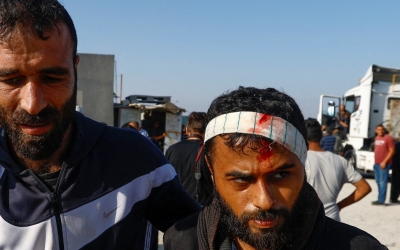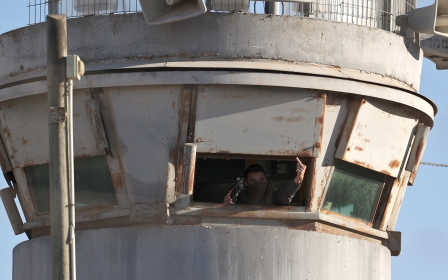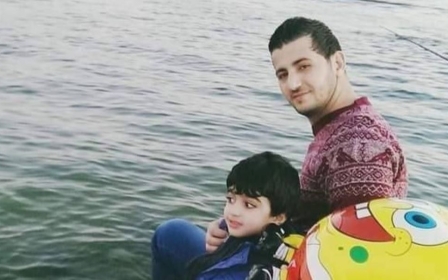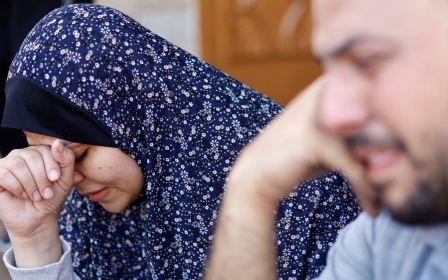Israel-Palestine war: Palestinian writer 'threatened with rape' in Israeli prison
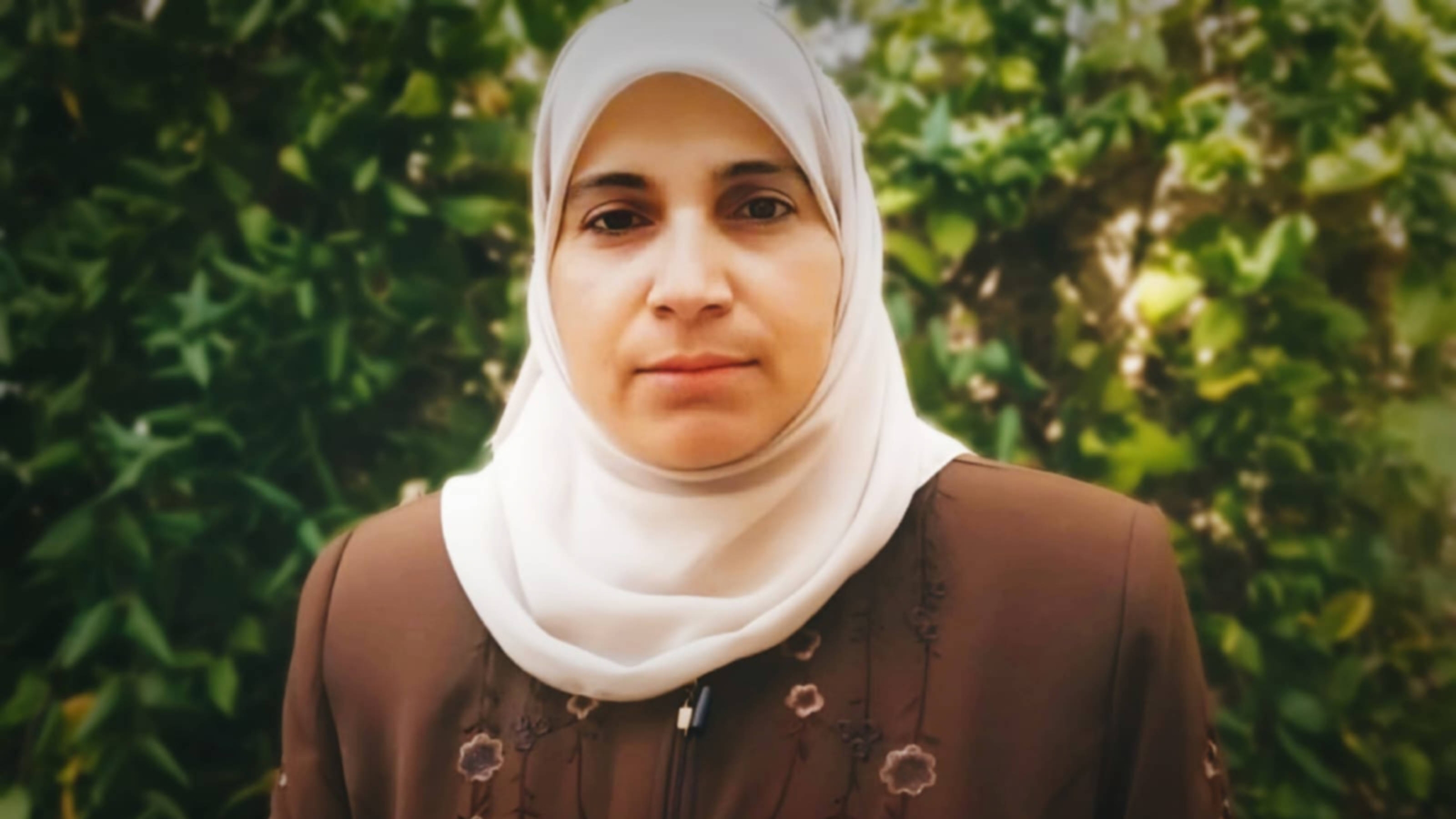
A few days ago, Hazem al-Fakhouri received a worrying call from lawyer Hassan Abadi informing him that he had visited his wife, writer Lama Khater, in an Israeli prison.
The news brought by the lawyer wasn’t good. Abadi's visit to the recently imprisoned Khater, 46, revealed the terrible treatment she, and other female prisoners, has endured in prison since the moment of her arrest until now.
Khater was arrested from her home in the occupied West Bank city of Hebron on 26 October as part of a massive arrest campaign that targeted a large number of Palestinians, including four women, that day.
After Hamas carried out a surprise attack on southern Israeli towns on 7 October, resulting in the death of around 1,300 Israelis, Israel launched a large-scale arrest campaign in the West Bank, targeting more than 2,000 Palestinians, including former female prisoners, female university students, and the wives of prisoners.
Since the attack, more than 10,500 Palestinians have been killed in Israel's relentless bombing campaign on the Gaza Strip.
New MEE newsletter: Jerusalem Dispatch
Sign up to get the latest insights and analysis on Israel-Palestine, alongside Turkey Unpacked and other MEE newsletters
Middle East Eye spoke with Abadi, who visited a group of female prisoners and relayed Khater’s testimony. He was told that female prisoners were threatened with rape and they were subject to a "policy of starvation" in prison.
After her arrest from her home, a handcuffed and blindfolded Khater was transferred to the Kiryat Arba police station near Hebron.
"There, she was threatened with rape by soldiers who told her, ‘We are 20 soldiers and we can do to you whatever we want. You are our prisoner of war,’” Abadi said.
But the threat was only the beginning. Khater was verbally abused and treated harshly, and, like other detainees, has had to endure full strip searches under the pretext of inspection.
“For the first time when I visit female prisoners, they tell me that they are subjected to a starvation policy, meaning that the meals provided to them are very few and hardly enough to satisfy their hunger," Abadi said.
"Khater also told me that they sleep on the floor without mattresses and don’t have extra clothes or blankets.”
Denied rights
On 27 October, an Israeli force stormed Damon Prison, where Palestinian female prisoners are held, and, without cause, assaulted them and fired gas bombs into their rooms, severely beating three of them and isolating others in solitary confinement, the lawyer said.
In addition, the prison administration is preventing prisoners from leaving their rooms and moving between sections, as well as limiting bathroom visits to only 15 minutes a day for every cell, which contains more than seven detainees.
Follow Middle East Eye's live coverage for all the latest on the Israel-Palestine war
“Since the 7 October, I have visited many female prisoners, some of whom were wounded or sick. Unfortunately, they are being denied their right to treatment and prevented from being transferred to medical clinics or to visit a doctor," the lawyer said.
Among these prisoners, he added, is 65-year-old Suhair al-Barghouti, known as Um Asif, who was detained on the same day as Khater.
Barghouti suffers from high blood pressure and diabetes, and underwent a heart operation three years ago. Since her arrest, the lawyer said, prison authorities, have not allowed her access to her medication.
"In all my years as a lawyer, this is the first time I have reported such mistreatment of female prisoners," Abadi said.
'Complete sabotage'
Khater's husband, Fakhouri, told MEE that he wasn’t very surprised by what the lawyer told him, because the mistreatment of his wife began from the moment the house was stormed.
'In all my years as a lawyer, this is the first time I have reported such mistreatment of female prisoners'
- Hassan Abadi, lawyer
"The soldiers began insulting her and threatening to kill our five children and behead them", he said.
After telling her she was under arrest, they refused to allow her to use the bathroom or take extra clothes with her.
Until now, Khater hasn’t been allowed to speak to her family over the phone. She is still awaiting a new trial session that may transfer her to administrative detention without charge, which will be renewed immediately after the expiration of its term.
"The soldiers were very arrogant and spoke to us barbarically. They tied her hands tightly inside the house and roughly dragged her with them," Fakhouri said.
The couple's children have been constantly crying since her arrest, Fakhouri said, especially their youngest son, seven-year-old Yahya, who is very attached to her.
Fakhouri had not told them about the circumstances of their mother’s detention, only reassuring them that she was fine and missed them.
A week after her arrest, however, Israeli soldiers once again stormed Khater's house under the pretext of searching for her phone, even though they had confiscated it when they detained her.
They tied up her husband, threw him to the ground, confined her children to the bathroom and closed it, then began vandalising the house.
"It wasn’t a search. It was complete sabotage. They broke the windows and doors. They removed the plants from the garden beds in the house and the balconies. They destroyed the furniture and stole 5,000 shekels ($1300).
"It wasn’t a confiscation, but rather a theft, because I discovered that after they left. They even opened my daughter's wallet and stole the money. They confiscated my sons' phones and a laptop.
“The soldiers also threatened to burn our house. The Israeli officer told me that we are under military rule now and they will do whatever they want to us. He told me, 'I will demolish your house and build my villa in its place'."
The family received calls from the United Nations representative in Palestine and from the embassies of Norway and Sweden to open an investigation about the threats to Khater. Fakhouri hopes that this will result in alleviating the suffering that the female prisoners are experiencing.
This is Khater's second arrest. In 2018, she was arrested for a full year on charges of incitement and writing that Israel considered hostile.
Days before her release, her eldest son, Osama, was arrested while studying at Birzeit University in 2019, and spent 22 months in Israeli prisons.
No red lines
More than 2,280 Palestinians, including more than 75 women, have been arrested since Israel began its crackdown on Palestinians in the West Bank after 7 October. A number of them have been released under conditions or after their relatives had surrendered themselves.
There are 65 female prisoners, including elderly and minors, currently detained in Israeli prisons.
Institutions concerned with the affairs of Palestinian prisoners have documented the harsh treatment to which Palestinian female prisoners are subject after their arrest.
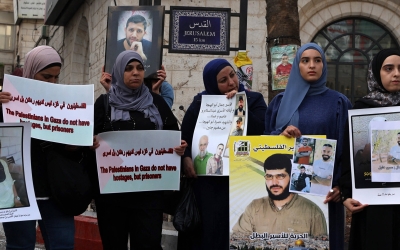
Amani al-Sarahna, spokeswoman for the Palestinian Prisoners’ Club, told MEE that there has been a major turning point in the treatment of female prisoners, which is characterised by maltreatment, beatings, starvation, deprivation of basic necessities, and constant threats.
She said that Israel is putting so much pressure on female prisoners that it appears that "there are no longer red lines".
"Among the testimonies we documented was the elderly Aisha Abu Jahisha, 68, from Idna, west of Hebron, who was arrested as a hostage to pressure her five sons to surrender themselves," Sarahna said.
"Aisha was subjected to horrific treatment, as she remained tied up for long hours and was deprived of even drinking water."
The Israeli army arrested her on 31 October from her home at 3 am. During her detention, she was interrogated about her sons and was threatened that if they didn’t surrender themselves, they would be killed.
During her detention, which lasted until 10:30 pm, the soldiers only allowed her to drink water once, even though she suffers from diabetes and high blood pressure.
"This case reveals to us more of the atrocities committed by soldiers against female prisoners. There are crimes committed against them without any reason, just for the sake of revenge and abuse," Sarahna said.
Middle East Eye delivers independent and unrivalled coverage and analysis of the Middle East, North Africa and beyond. To learn more about republishing this content and the associated fees, please fill out this form. More about MEE can be found here.


